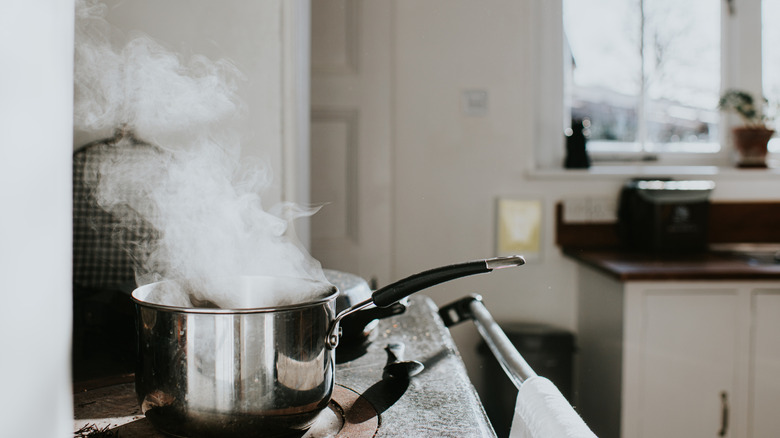The Apple Peel Trick For Squeaky Clean Pots & Pans
When it comes to cleaning pots and pans, it seems like there are a million different tricks. However, how many do you know of that involve nothing but kitchen scraps? We spoke with Imam Mansoor Rafiq Umar, president and CEO at Halal Watch World LLC, to learn how to use apple peels to promote a zero-waste, environmentally-friendly kitchen cleanup.
"To clean scorched pots, boil apple peels in water to release their natural malic acid, which can help loosen that stuck-on grime," the expert shared. "I soak peels from 2-3 apples in my stainless steel pan for 10-15 minutes, then scrub with a soft sponge." Heat and water work together to moisten and loosen stuck-on grime, but sometimes they need a little extra boost to really get pots and pans squeaky clean. Malic acid is a particularly good choice because it's tough on germs and bacteria, and can even clean off rust in high enough concentrations.
While less than 1% of an apple peel's weight is malic acid, it's enough to give boiling water the extra cleaning power it needs to give your pots and pans a new shine, particularly for stubborn jobs like cleaning crusty food from stainless steel pans or burnt juices from a sheet pan. Still, Umar was quick to tell us you shouldn't clean every pot and pan with this method.
The right (and wrong) kind of cookware to clean with apple peels
Pay close attention to the material of your cookware before attempting this cleaning hack. Particularly delicate pots and pans need a gentle touch that even apple peels and a soft sponge may be too abrasive for. Though this is still a gentle cleaning method, some of your kitchenware may react poorly to the acid, eroding away coatings or even the material of the pan itself until they are unusable.
"This works best on stainless steel or enamel, but avoid delicate non-stick surfaces to prevent scratching," Imam Mansoor Rafiq Umar told Food Republic. "Always rinse thoroughly after." Though it comes from apples and is perfectly safe to consume, malic acid may corrode your stainless steel or aluminum pans if left to sit over time. Luckily, both materials are tough to the point that a thorough rinse is all you need to prevent this from happening. The same is true of enameled pieces like Dutch ovens, which manufacturers expect to come in contact with acidic ingredients.
However, this cleaning method is more corrosive to carbon steel, so never use apple peels on pots or pans of this material (even in small quantities) when you are looking to gently clean stoneware. Since stone is porous and reactive to acid, even tiny amounts may etch it away. Once you double check which materials are present in your kitchen, however, many of them likely will benefit from this zero-waste cleaning trick.


